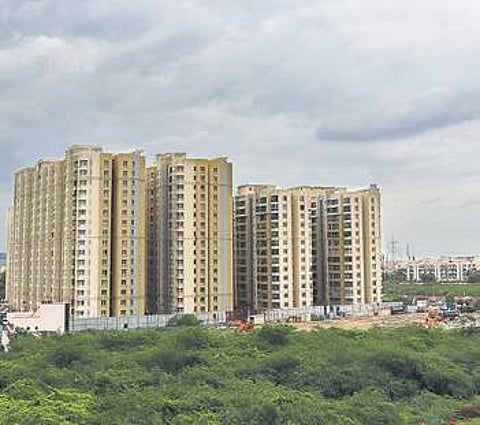

CHENNAI: The Tamil Nadu government formed a Special Task Force (STF) to crack down on illegal buildings across the city following a government order (G.O.) issued in December 2018. Three years on, action has remain limited to paperwork and meetings, with hardly any concrete steps taken in this regard.
While top officials told TNIE they are examining the essence of the G.O., the meetings seemed to be an eyewash. Of the last five ones, held during the AIADMK regime, representatives of key departments such as the Fire Services and Public Works Department abstained from the first four.
The STF was formed after the Union Ministry of Housing and Urban Affairs asked the State in 2018 to take necessary steps after the Supreme Court suggested that the Union government issue an advisory to all States. The idea was to improve civic facilities and reduce inconvenience costs to residents of cities.
The State government formed two special task forces to address issues pertaining to encroachments, unauthorised construction, and enforcement of provisions of the Second Master Plan in the Chennai Metropolitan Area (CMA) and areas under the jurisdiction of the Directorate of Town and Country Planning and the Composite Local Planning Authority.
The formation of the task force was initially mooted by the High Court-appointed Monitoring Committee in 2008. It was one of the first recommendations of the committee but there has been no check on unauthorised construction.
The role of the 14-member task force for the CMA, as per the G.O., was to monitor unauthorised constructions, misuse of land, encroachment of public land, and other violations of the Second Master Plan and other laws. The STF was to ensure urban local bodies take up formation of a unified integrated web portal wherein all complaints or issues within an area may be recorded and which shall be reviewed by the STF. It was also mandated to clear encroachments on footpaths, under passes and other public areas. The field staff were to be given GPS-enabled cameras to record violations and use them as evidence to take action.
Former Anna University professor of urban engineering KP Subramanian says the Town and Country Planning Act 1971 has deterrent provisions such as demolition, locking, and sealing, imposing penalties, including imprisonment, to act against unauthorised and violative developments. Local bodies’ acts provide for prosecution and levy of penalty, including continuous penalty on a day-to-day basis so long as the offence continues. Nevertheless, violations and unauthorised developments mushroom.
This should make the officials ponder whether practical Development Regulations and Building Rules are formulated with effective participation of stakeholders. The government should come out with a transparent and straightforward approval system so the common people in general and the professionals, builders and land owners in particular don’t lose faith in the rules and regulations.
Similarly, government agencies should act as enablers and facilitators rather than controlling authorities. If this is followed, there may not be a role for the task force, said the former professor. Or else, it would simply add to the existing plethora of institutions, he added.